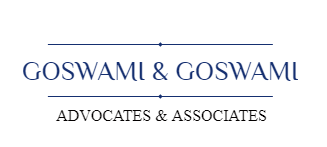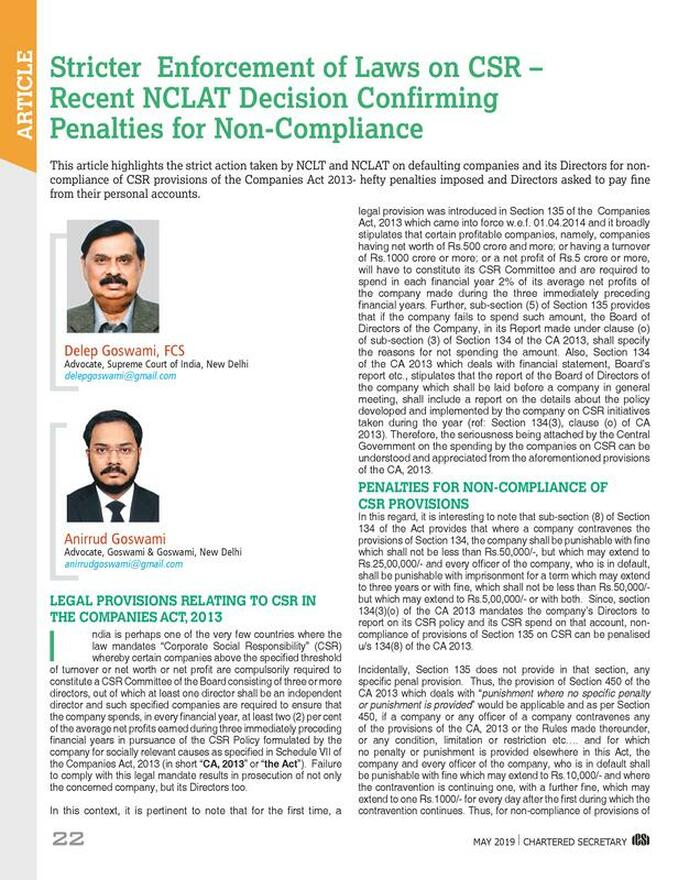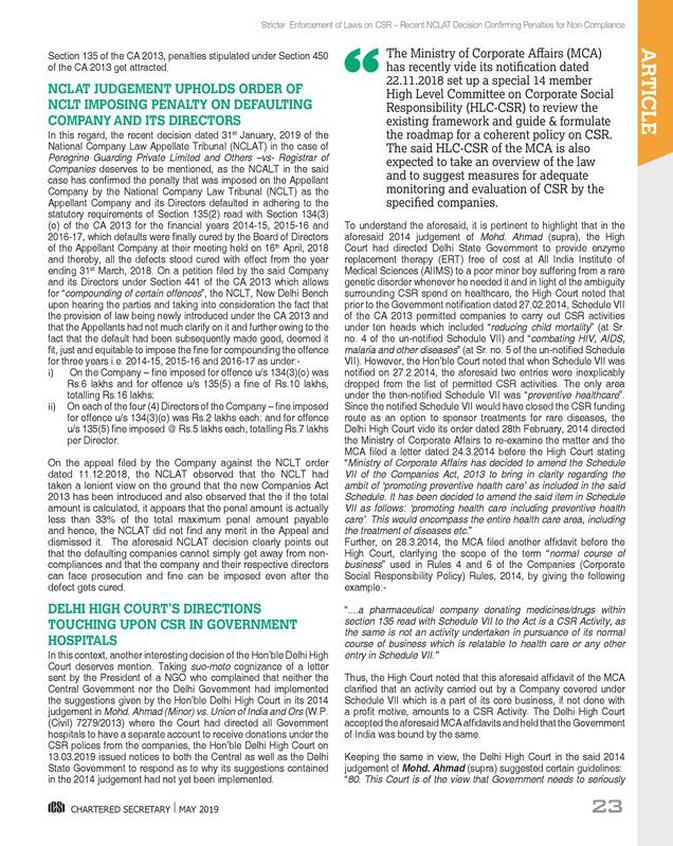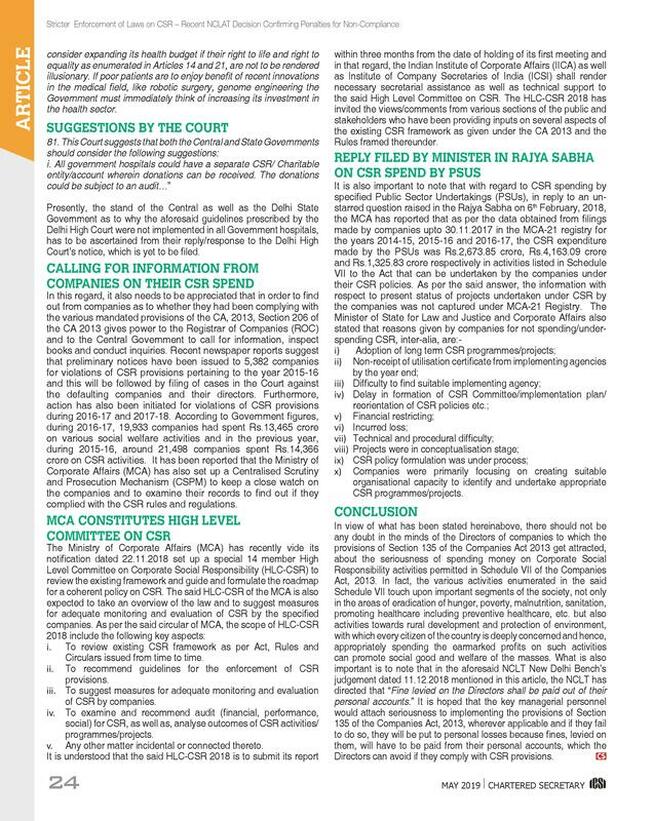|
5/22/2019 0 Comments Students filing RTI to obtain copy of answer sheet to pay fee as per RTI Act only Delep Goswami, FCS Advocate Supreme Court of India New Delhi  Anirrud Goswami Advocate, Goswami & Goswami May 20, 2019 [2019] 105 taxmann.com 244 (Article) Supreme Court's Judgment affirms that fee under RTI Rules shall apply for an RTI Application In a significant judgment on the interpretation of the provisions of the Right to Information Act, 2005 (RTI Act), the Hon'ble Supreme Court of India in its judgment dated 11th April, 2019 in the Civil Appeal No. 5665 of 2014 : Institute of Company Secretaries of India (ICSI) v. Paras Jain (hereinafter, "ICSI case") has upheld the order dated 22nd April, 2014 passed by the Hon'ble Delhi High Court which set aside Guideline No. 3 notified by the Statutory Council of the Appellant-Institute (ICSI) and directed it to charge fee prescribed as per Rule 4 of the Right to Information (Regulation of Fees and Cost) Rules, 2015 (in short "RTI Rules, 2005"). ICSI Case - Brief Facts The factual matrix of the case is that the Respondent appeared in the final examination of the ICSI held in December, 2012. On being unsuccessful in qualifying the examination, the Respondent made an application under the RTI for inspection of his answer sheets and subsequently sought for certified copies of the same from the Appellant. The Appellant thereafter demanded Rs. 500/- per answer sheet payable for supply of certified copy(ies) of answer books and Rs. 450/- per answer book for providing inspection thereof respectively as per Guideline No. 3 notified by the Statutory Council of the ICSI. The Respondent made the aforesaid application for obtaining the said information under the RTI Act. Being aggrieved by the demand made by the ICSI, the Respondent preferred a Writ Petition before the Delhi High Court wherein the learned Single Judge dismissed the petition. A Letters Patent Appeal was thereafter preferred by the Respondent wherein the Division Bench of the High Court quashed Guideline No. 3 notified by the Appellant - ICSI and held that the Appellant could charge only the prescribed fee under Rule 4 of the RTI Rules, 2005. On appeal, the short issue before the Hon'ble Supreme Court was that when the answer scripts of the Respondent-candidate is sought, whether the fee prescribed under Rule 4 of the RTI Rules, 2005 is payable or that fee prescribed under the prescribed Guideline No. 3 of the ICSI Rules?. Arguments Of Examinee and the Institute Before the Supreme Court During the course of argument of the Civil Appeal in the Supreme Court, on behalf of the ICSI, it was argued that it was undisputed that the RTI Act was applicable to the case of the Appellant. However, in light of the fact that specific guidelines were formulated under The Company Secretaries Act, 1980 which govern the Appellant, the same should be applicable and not that which was provided under the RTI Act. It was further contended by the Appellant - ICSI that owing to the Division Bench of the Delhi High Court quashing the Guideline No. 3 prescribed by the ICSI, the Appellant-Institute could not collect any amount of fee except the one prescribed under Rule 4 of the RTI Rules, 2005, which added to financial strain on the Appellant. On the other hand, the Respondent's counsel contended that any candidate who sought his answer scripts under the RTI Act, 2005 could only be charged fee under Rule 4 of the RTI Rules, 2005. On behalf of the Respondent, it was further contended that the candidates must have a choice to seek the answer scripts either via the avenue under the RTI Act or under the Guidelines of the Appellant Institute under the Company Secretaries Act, 1980. SC: If information sought for by examinee was RTI Application under RTI Act, then fee under RTI Rules would apply Having heard the learned counsels appearing for both the parties and having meticulously perused the record, the Supreme Court noted that the Appellant was governed by the provisions of the Company Secretaries Act, 1980 and under Sections 15, 15A and 17 thereof, the Examination Committee of the Statutory Counsel of the Appellant had framed Guideline No. 3 providing an avenue to the candidates to either inspect their answer scripts or seek certified copies of the same on payment of the stipulation fees. As per Guideline No. 3 thereof, the prescribed fee was Rs. 500/- for obtaining certified copies of the answer scripts and Rs. 450/- for seeking inspection of the same. On the contrary, Rule 4 of the RTI Rules, 2005 prescribed a fee of Rs. 2/- for each page created or copied; and for inspection of records no fee was to be charged for the first hour and a fee of Rs. 5/- was to be charged for each subsequent hour or fraction thereof. In other words, the fee prescribed under the RTI Rules, 2005 was much cheaper compared the fee levied under the ICSI Rules. The Supreme Court noted that it was clear that the avenue for seeking certified copies as well as inspection was provided both in the RTI Act, as well as in the Statutory Guidelines of the Appellant-Institute. The Supreme Court also noted that the guidelines of the Appellant framed by its Statutory Council were to govern the modalities of its day-to-day concerns and to effectuate smooth functioning of its responsibilities under the Company Secretaries Act, 1980. The said guidelines of the Appellant might provide for much more than what was provided for under the RTI Act, such as re-evaluation, re-totalling of answer scripts. The Supreme Court went on to hold that the Guideline No.3 of the Appellant would not take away from Rule 4 of the RTI Rules, 2005 which also entitled the candidates to seek inspection and certified copies of their answer scripts and that in its opinion, the existence of those two avenues was not mutually exclusive and it was up to the candidate to choose either of the routes. Thus, if a candidate sought information under the provisions of the RTI Act, then payment had to be sought under the Rules framed under the said Act. However, if the information was sought under the Guidelines framed by the Appellant Institute, then the appellant was at liberty to charge the candidate as per its Guidelines. With regard to the issue about the Division Bench of the Delhi High Court quashing of the Guideline No.3 framed by the Appellant-Institute, the Supreme Court noted that such quashing of the Guideline was affecting the Appellant and also other candidates and that the quashing was done despite no prayer being made to that effect on behalf of the Respondent and, hence, the Supreme Court held that such quashing of Guideline No. 3 of the Appellant Institute was unwarranted. It was to that limited to extent that the Supreme Court allowed the Appeal and set aside the impugned order of the Division Bench of the Delhi High Court whereby it quashed the Guideline No.3 of the Appellant Institute. With regard to the contention of the Appellant that owing to the nominal fee fixed under the RTI Act, the dissemination of information by the Appellant had become financially burdensome and, thus, the Appellant wanted to make a representation to the Government for enhancing the fee prescribed under the RTI Act, the Supreme Court left it open to the Appellant to make such a representation. Supreme Court's landmark judgment in the CBSE case No discussion on the right of the students/candidates/examinees to have access to the information relating to their answer papers/evaluation and to obtain copies thereof, would be complete without reference to a very important judgment dated 9th August, 2011 of the Hon'ble Supreme Court of India in the case of Central Board of Secondary Education (CBSE) v. Aditya Bandopadhyay [2011] 8 SCC 497 (henceforth, "the CBSE case") in the context of the provisions of the Right to Information Act, 2005. In the said CBSE case, the main issue was whether a party who was an examinee was eligible to access his/her answer book for the purpose of revaluation and inspection under the RTI, wherein the Hon'ble Supreme Court held that the examinee had right to access those scripts provided that the request was made during a reasonable time in which the authorities were expected to retain the answer scripts. Object and scope of the provisions of the RTI Act The Supreme Court observed that the Statement of Object to the RTI Act, 2005 states that "right of a citizen to secure the access to information under the control of public authorities in order to promote transparency and accountability in the working of every public authority." Section 3 of the RTI Act states that subject to the provision of this Act all citizens shall have a right to information. Section 4 of the RTI Act relates to maintaining the record and publishing and disseminating the information in a manner provided for under the Act. Further, Section 6 of the said RTI Act empowers common citizens to "request for providing information and there is no need to provide any reason for that" and Section 2(f) of the RTI Act defines the term "information", which means any material in any form, including records, documents, memos, e-mails, opinions, advice, press release, circulars, orders, logbooks, contracts, reports, papers, samples, models, data material held in any electronic form and information relating to any private body which can be accessed by a public authority under any other law for the time being in force. Further, Section 2(h) of the RTI Act defines the term "Public Authority" which means any authority or body or institution of self-government established or constituted by or under the Constitution; by any other law made by the Parliament; by any other law made by the State Legislature; and by notification issued or order made by the appropriate Government and includes any (i) body owned, controlled or substantially financed; and (ii) non-Governmental organisation substantially financed, directly or indirectly by funds provided by the appropriate Government. Again, Section 2(i) of the RTI Act defines "Record" and includes any document, manuscript and file, any micro-film, micro-fiche and facsimile copy of a document; any reproduction of image or images embodied in such micro-film (whether enlarged or not) and any other material produced by a computer or any other device. Most importantly, Section 2(j) of the RTI Act defines what is "right to information" and it means the right to information accessible under the RTI Act which is held by or under the control of any public authority and includes the right to - (i) Inspection of work, documents, records; (ii) Taking notes, extracts or certified copies of documents or records; (iii) Taking certified samples of material; (iv) Obtaining information in term of diskettes, floppies, tapes, video cassettes or in any other electronic mode or through printouts. In the aforesaid CBSE case (supra), an examinee who appeared in the examination conducted by the CBSE, was denied his request for revaluation and inspection of his answer sheets. In a writ petition, the examinee approached the Calcutta High Court which allowed his petition for inspection only and not of revaluation. In the appeal filed by the CBSE before the Supreme Court of India, the issues involved were:- (a) Whether an examinee's right to information under the RTI Act includes the right to inspect his evaluated answer books in a public examination or taking certified copies thereof? (b) Whether the examining body holds the evaluated answer books in a "fiduciary relationship" and, consequently, has no obligation to give an inspection of the evaluated answer books under section 8(1)(e) of the RTI Act ? (c) If the examinee is entitled to inspection of evaluated answer books or seek certified copies thereof, whether such right is subject to limitation, condition and safeguard ? SC: Examination answer-sheets are 'Information' that can be sought for under the RTI Act After hearing the arguments of both sides, the Supreme Court held that the answer book written by a candidate and submitted to examining body for evaluation is a "document of Record" and the evaluated answer book by the examiner appointed by the examining body is the "opinion" of the examiner. Thus, the evaluated answer book is an "information" under the RTI Act and this answer book also does not fall under any of the exemptions provided under clauses (a) to (j) of sub-section (1) of Section 8 of the RTI Act. Thus, every examinee has a right to inspect the evaluated answer book and if needed, can take certified copies thereof under the RTI Act. The said Supreme Court judgment in the CBSE case (supra) has paved the way for students who are aggrieved by the evaluation of any examining bodies, such as a University; State Education Board; State Public Service Commission and such a student can claim his evaluated answer book for the purpose of inspection and can take certified copy of it under the RTI Act, but only during the time those authorities are expected to maintain and retain the answer book of all examinees under its control. Conclusion The right to information is a cherished right of every citizen of India and information and right to information are intended to be formidable tools in the hands of responsible citizens to fight corruption and to bring in transparency and accountability. This is the genesis of the RTI Act. The judgments referred to in this article make it abundantly clear that an examinee need not silently suffer on account of the inaccuracies in the evaluation process of the answer sheets of the examinee and such an examinee has even the right to have certified copies of the evaluated answer sheets, which may help him in seeking re-evaluation of his answer sheets. The high-handed, whimsical and fanciful decisions of some of the examining bodies adversely affects the career of a students and this can no longer be tolerated and even the inadvertent mistakes can be corrected, if the examinee seeks to resort to the provisions of the RTI Act and its Rules. The ambiguity surrounding the issue as to what fee would be applicable in case an examinee-candidate seeks information from the examining body, has been laid to rest by the aforesaid ICSI judgment of the Supreme Court. It is thus clear that in the event such information sought for is under the provisions of the RTI Act, then the fee prescribed under the RTI Rules would apply whereas if the examinee resorts to seeking such information under the provisions of the special enactments under which the concerned examining institute/body has been set-up, the examinee has to pay the fee prescribed under the specific Act governing such an institute/body and not as per the RTI Act. ■■
0 Comments
|
Author@Delep Goswami, F.C.S., Advocate; Archives
November 2021
Categories |




 RSS Feed
RSS Feed
